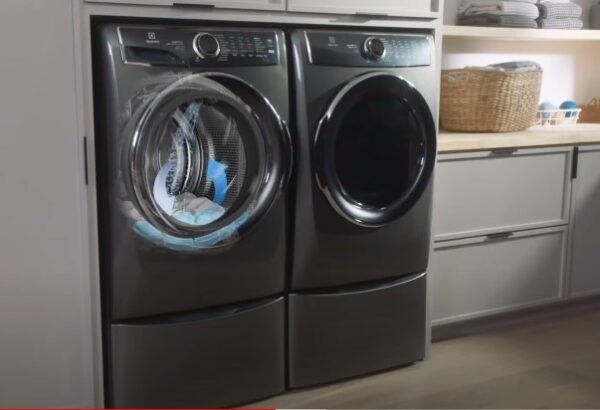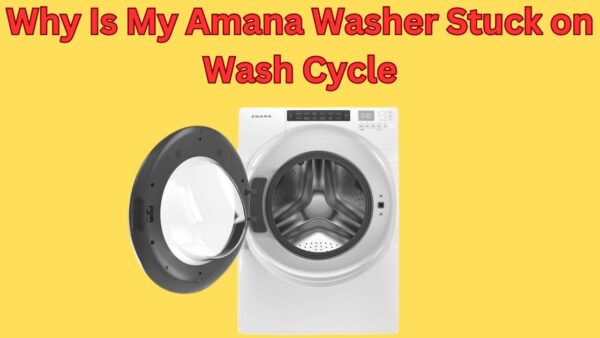A high-pitched noise from your washing machine can turn a normal laundry day into an annoying ordeal.
Fortunately, identifying and fixing the cause of this unsettling noise doesn’t have to be complicated.
This guide provides 15 easy fixes for a high-pitched noise in your washing machine. Whether it’s a loose component, a blockage, or an issue with the motor, we’ve got you covered.
Washing Machine High Pitched Noise

1. Unbalanced Load
Cause
An unbalanced load is a common cause behind the high-pitched noise emitted by your washing machine.
This usually occurs when heavy or large pieces of clothing get concentrated on one side of the washer during a cycle, causing an uneven distribution of weight.
The washing machine then spins off balance, which can result in a high-pitched noise due to excessive vibration and friction.
Solution
To rectify this issue, pause the washing machine and manually redistribute the items in the drum, ensuring an even balance.
For future washes, try to mix large and small items in each load to promote balance.
In addition, ensure your washing machine is level on the floor; if not, adjust the feet or place a sturdy platform underneath to stabilize it.
2. Faulty Motor
Cause
A faulty motor can often lead to a high-pitched noise in your washing machine.
This usually happens when the motor bearings are worn out or damaged.
The bearings allow the motor to turn smoothly, and when they are not functioning properly, they can cause a noticeable and disruptive noise.
Solution
If your washing machine is making a high-pitched noise due to a faulty motor, the most effective solution is to replace the motor or the bearings.
This task typically requires professional help due to the complexity and potential risks involved.
Therefore, once you’ve determined that the motor is the culprit, consider contacting a qualified technician to handle the repair or replacement.
3. Damaged Drive Belt
Cause
A damaged drive belt in a washing machine could result in a high-pitched noise.
This belt is responsible for the drum’s rotation, and when it wears out or becomes loose, it might squeak or squeal during a cycle, especially when the machine is spinning at high speeds.
Solution
The solution for a damaged drive belt lies in its replacement.
This task can be complex and requires some technical knowledge. Therefore, it’s advisable to call in a professional appliance repair technician.
However, if you’re comfortable with appliance repair, you can purchase a replacement belt specifically suited for your washing machine model and install it by following the manufacturer’s instructions.
4. Worn-Out Tub Bearing
Cause
A worn-out tub bearing is often the culprit when your washing machine makes a high-pitched noise.
This can occur due to the regular wear and tear of the machine over time, particularly if the machine is frequently overloaded or if hard water conditions prevail.
The tub bearing is a crucial component that supports the rotation of the drum, and any damage to it can lead to unpleasant noises during the wash cycle.
Solution
To resolve the issue of a worn-out tub bearing, a complete replacement is usually necessary.
It’s a complex task that may require professional assistance due to the intricacies of the machine’s design.
After replacement, ensure to follow the manufacturer’s instructions regarding load size and preventative maintenance to prolong the life of the new tub bearing.
5. Loose Pulley
Cause
A loose pulley can cause a high-pitched noise in your washing machine.
It is typically a result of wear and tear, leading to a worn-out belt and a misaligned drive pulley.
This misalignment creates friction and ultimately results in a screeching noise that can be quite disturbing.
Solution
To solve the high-pitched noise caused by a loose pulley, inspection, and realignment of the drive pulley might be required.
If the pulley is excessively worn out, it may need to be replaced. Always ensure to tighten the pulley securely after adjustment or replacement to prevent further misalignment.
Remember, it’s advisable to consult a professional if you aren’t comfortable performing these tasks yourself.
6. Blocked Drain Pump
Cause
The drain pump in a washing machine could possibly be blocked if there is a high-pitched noise during the spin cycle.
Small items like coins, hairpins, or even lint can get stuck in the pump, causing it to make an abnormal sound as it struggles to drain the water out of the machine.
Solution
The solution to a blocked drain pump involves removing the obstruction.
First, you should disconnect the washing machine from power.
Then, you can locate the pump (usually at the bottom of the machine), and inspect the pump filter for any debris. If found, carefully remove the items and then reassemble the washing machine.
Run a short wash cycle without any clothes to ensure the machine is functioning normally. If the noise persists, it may be best to consult a professional.
7. Broken U-Joint
Cause
A broken U-joint, or universal joint, could cause a high-pitched noise in your washing machine.
The U-joint is a component that connects the machine’s drum to its motor, allowing the drum to rotate.
If this part is broken or worn out, it could result in a strain on the machine, causing a high-pitched squealing noise during operation.
Solution
The solution to a broken U-joint typically involves replacing the part.
It’s recommended to hire a professional technician to handle this task, as it involves disassembling the washing machine, which could be complex for those unfamiliar with appliance repairs.
Replacement parts should be of the same model to ensure compatibility and efficiency.
8. Damaged Shock Absorber
Cause
A high-pitched noise from your washing machine could be the result of a damaged shock absorber.
The shock absorber is a key component in the machine that helps to keep it stable during a wash cycle.
If it’s damaged, the uncontrolled movements can produce a high-pitched squeal as the internal parts of the machine rub against each other in an abnormal fashion.
Solution
The most effective solution for a damaged shock absorber is replacement.
Turn off and unplug the washing machine, then consult with a professional or refer to your user manual for guidance.
Keep in mind that continuing to use a washing machine with a damaged shock absorber could lead to further damage.
9. Malfunctioning Water Inlet Valve
Cause
The water inlet valve on your washing machine controls the entry of hot and cold water into your machine.
This valve can become either blocked or leaky, or it might start making a high-pitched noise if it’s malfunctioning.
This could be due to a variety of reasons such as age, faulty installations, or accumulation of mineral deposits.
Solution
If your washing machine’s water inlet valve is making a high-pitched noise, it would be best to replace it.
Most valves are not designed to be cleaned or repaired, so replacement is often the most cost-effective solution.
You can either call a professional or opt for a DIY approach if you’re handy with appliances.
Remember to unplug the washing machine and turn off the water supply before starting the repair.
10. Faulty Pressure Switch
Cause
A faulty pressure switch can often be the culprit behind a high-pitched noise in your washing machine.
This component is responsible for detecting the water level in the machine.
If it malfunctions, it could send incorrect signals to the machine’s control board, leading to overfilling and causing an unusual noise.
Solution
The optimal solution for a faulty pressure switch is usually replacement.
Unplug the washing machine, and locate the pressure switch – typically it’s a diaphragm device with a small tube connected to it which is located near the bottom of the drum.
Remove it and replace it with a new one. It’s always recommended to consult with a professional or refer to your machine’s manufacturer’s manual to ensure accurate troubleshooting.
11. Worn Out Drive Pulley
Cause
The Drive Pulley is a key component in your washing machine that is responsible for spinning the drum.
If the drive pulley is worn out or damaged, it might not spin as it should, leading to a high-pitched noise.
This could be due to regular wear and tear or because of overloading the machine frequently.
Solution
The solution to a worn-out drive pulley is replacing it. It is a complex process that involves dismantling the washer, and hence, it is recommended to seek professional assistance.
Make sure to provide the make and model of your washing machine to the technician so they can source the correct replacement pulley.
Regular maintenance and adhering to load recommendations can prevent such issues in the future.
12. Clogged Filter
Cause
A clogged filter in a washing machine can sometimes cause a high-pitched noise.
Over time, debris such as lint, hair, and bits of fabric can accumulate in the filter, obstructing the water flow.
This blockage can cause the machine to work harder to pump the water, resulting in a high-pitched noise.
Solution
The solution to a clogged filter is relatively straightforward.
Start by turning off and unplugging the washing machine for safety.
Then locate the filter, usually found at the bottom of the machine.
Remove the filter and clean it thoroughly, ensuring all debris is removed. Once cleaned, replace the filter and run a test cycle to ensure the noise is gone. Regular cleaning of the filter can prevent future clogging and noise.
13. Failing Transmission
Cause
A failing transmission in your washing machine can certainly lead to a high-pitched noise during its operation.
This usually happens when the bearings within the transmission are worn out or damaged.
The bearings are crucial for the smooth, noiseless rotation of the inner tub. When these wear down due to constant use, or lack of lubrication, they can cause an unusual, high-pitched noise.
Solution
The most effective solution to a failing transmission causing a high-pitched noise is to replace the worn-out bearings.
This should ideally be done by a certified technician to ensure correct installation.
In some cases, it may be more cost-effective to replace the whole transmission – especially if the washing machine is an older model.
Regular maintenance and checks can prevent such issues from escalating, ensuring your appliance continues to operate quietly and effectively.
14. Obstructed Coin Trap
Cause
An obstructed coin trap in your washing machine can result in a high-pitched noise during operation.
This is typically due to loose items such as coins, keys, or even small pieces of clothing getting stuck in the trap, leading to a rattling sound as the machine runs.
Solution
To solve this, you will need to clean out the coin trap, which is usually accessible via a small door at the bottom of the machine.
Make sure the washer is turned off and unplugged before doing so. Open the coin trap door, and drain any water if necessary, before removing the obstruction.
After cleaning, replace the coin trap door and plug the machine back in. The noise should be resolved if the coin trap was the issue.
15. Damaged Spinner Support.
Cause
A common cause of a high-pitched noise in a washing machine can be damaged spinner support.
The spinner support holds up the drum and allows it to rotate smoothly. When it gets damaged, it can create an imbalance in the motion of the drum during a wash cycle.
This imbalance can cause the drum to spin unevenly, often leading to a high-pitched noise.
Solution
The solution in this case would be to replace the damaged spinner support.
This task, although seeming straightforward, can be complex and may require a professional appliance repairer.
It involves removing the drum, replacing the damaged spinner support, and reinstalling the drum.
It’s vital to ensure the installation is correctly done to avoid further complications or damage to the machine.
Conclusion
In conclusion, a high-pitched noise from your washing machine should never be neglected.
It’s often a sign of a mechanical issue that requires immediate attention.
While common causes may include worn-out bearings, misaligned parts, or an overloaded machine, it is always advisable to seek professional help to accurately diagnose and fix the problem.
Regular maintenance and following manufacturer instructions can also help prevent such issues, ensuring your machine operates efficiently for many years.
FAQs
Why is my washing machine making a high pitch noise?
Your washing machine could be making a high-pitched noise due to a faulty pump or a problem with the belt. These components could be worn out or may need adjustment.
Why is my washing machine making a high-pitched whistling sound when filling?
A high-pitched whistling sound when your washing machine is filling could be due to a problem with the inlet valve.
When the valve is not functioning properly, it can cause a whistling or squealing sound as water tries to pass through.
Why is my Samsung washing machine making a high-pitched sound?
Your Samsung washing machine may produce a high-pitched sound if there’s an issue with the motor or if the drum bearings are worn out.
Kenmore Washer Lid Lock Flashing
washer won’t agitate makes noise
GE Washer Clicking Noise During Agitation
Why Is My New Whirlpool Washer So Loud
Dryer Taking Multiple Cycles to Dry
Whirlpool Washer Not Agitating Properly
Whirlpool Washer Won’t Agitate but Will Spin
Whirlpool Washer Locked Light Flashing
Front Load Washer Filling With Water When Off
Why Is My Amana Washer Stuck on Wash Cycle


